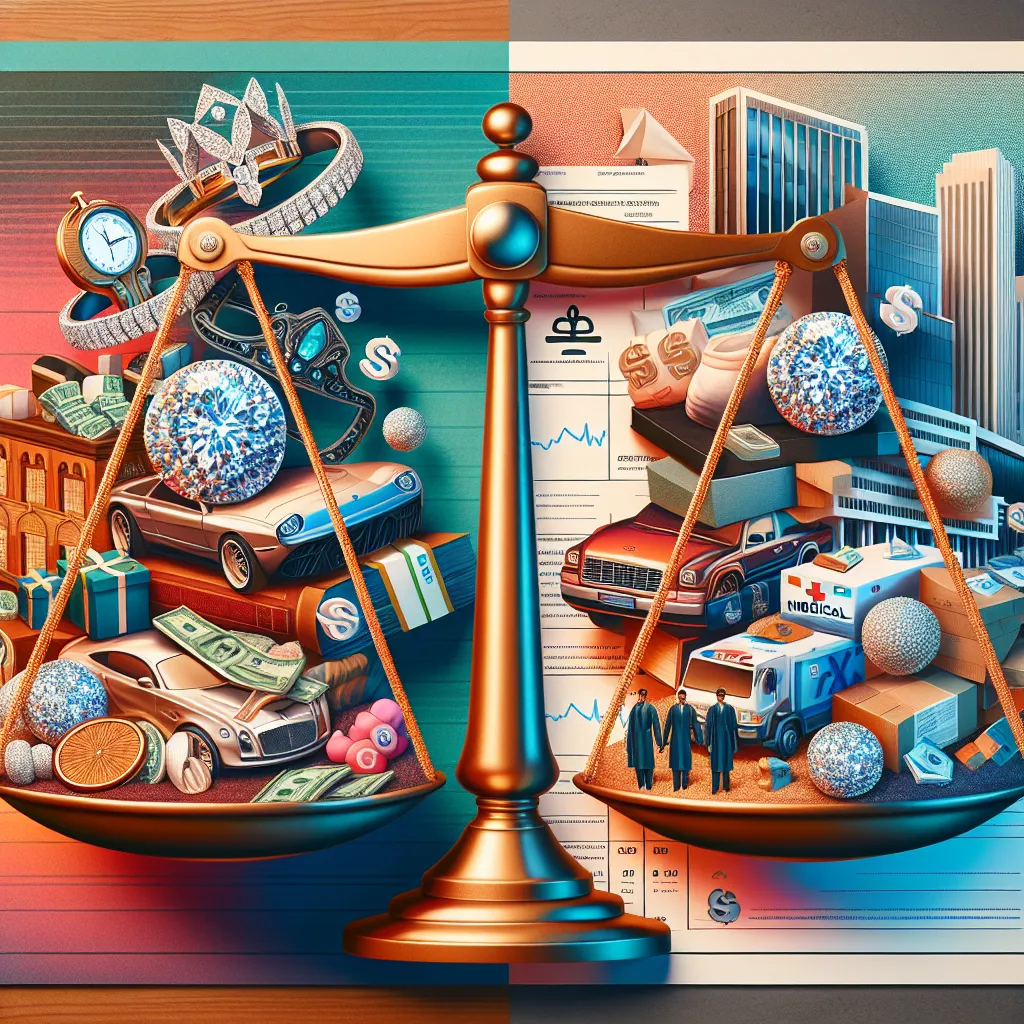The topic of whether governments should impose higher taxes on luxury goods is a recurring theme in IELTS Writing Task 2. This question has appeared in various forms over the years and continues to be relevant due to its connection to economic policies, social equality, and consumer behavior. Based on past exam trends and the ongoing relevance of this issue, it’s highly likely that similar questions will continue to appear in future IELTS exams. Let’s explore this topic in depth with sample essays for different band scores.
Nội dung bài viết
 Luxury Goods Taxation
Luxury Goods Taxation
Analyzing the Question
For this essay, we’ll focus on the following question:
Some people believe that governments should impose higher taxes on luxury goods. Others argue that this is unfair. Discuss both views and give your own opinion.
This question requires you to:
- Discuss the arguments for imposing higher taxes on luxury goods
- Discuss the arguments against this policy
- Provide your own opinion on the matter
Remember to address all parts of the question and maintain a balanced approach throughout your essay.
Sample Essay for Band 8
Luxury goods taxation is a contentious issue in many countries, with proponents arguing for higher levies on high-end products while opponents claim such measures are unjust. This essay will examine both perspectives before presenting my own viewpoint.
Those in favor of increased taxes on luxury items often cite social equality and revenue generation as primary reasons. They argue that individuals who can afford expensive, non-essential goods should contribute more to society through higher taxes. This additional revenue could be used to fund social programs or improve public infrastructure, potentially reducing income inequality. Moreover, proponents contend that luxury taxes might discourage excessive consumption and promote more responsible spending habits among the wealthy.
On the other hand, critics of luxury goods taxation argue that it is unfair and potentially counterproductive. They claim that people who have worked hard to earn their money should not be penalized for their success by paying extra taxes on their purchases. Additionally, opponents worry that higher taxes on luxury goods could harm businesses in the high-end retail sector, potentially leading to job losses and reduced economic growth. There are also concerns that such taxes might encourage black market activities or drive wealthy consumers to make their purchases abroad, ultimately reducing tax revenue.
In my opinion, while both arguments have merit, I believe that moderate luxury taxes can be beneficial if implemented thoughtfully. A well-designed luxury tax system could generate additional revenue for important social programs without significantly impacting the overall economy. However, it is crucial to strike a balance to avoid stifling economic growth or driving consumers to seek alternatives. Governments should carefully consider the threshold at which luxury taxes apply and ensure that the rates are not prohibitively high.
In conclusion, the debate over luxury goods taxation is complex, with valid arguments on both sides. While I support the idea of higher taxes on luxury items, I believe that such policies must be implemented judiciously to maximize societal benefits without causing undue harm to businesses or the economy as a whole.
(Word count: 309)
Analysis of Band 8 Essay
This essay demonstrates the qualities expected of a Band 8 response:
-
Task Achievement: The essay fully addresses all parts of the task, discussing both views and clearly presenting the writer’s own opinion.
-
Coherence and Cohesion: The essay is well-organized with clear paragraphing and effective use of cohesive devices (e.g., “On the other hand,” “Moreover,” “In conclusion”).
-
Lexical Resource: The essay uses a wide range of vocabulary accurately and appropriately (e.g., “contentious,” “proponents,” “levies,” “counterproductive”).
-
Grammatical Range and Accuracy: The essay demonstrates a wide range of grammatical structures used accurately and flexibly (e.g., complex sentences, passive voice, conditional structures).
Sample Essay for Band 6-7
Many people debate whether governments should put higher taxes on luxury goods. Some think it’s a good idea, while others believe it’s not fair. This essay will look at both sides of the argument and give my opinion.
Those who support higher taxes on luxury items say it can help society and raise money for the government. They think that people who can buy expensive things like designer clothes or fancy cars should pay more taxes. This extra money could be used to help poor people or improve schools and hospitals. Also, they believe that higher taxes might make rich people think twice before buying too many luxury things.
However, people against this idea argue that it’s not fair to tax luxury goods more. They say that if someone works hard and earns a lot of money, they should be able to buy what they want without extra taxes. They also worry that higher taxes on luxury goods might hurt businesses that sell these items, which could lead to people losing their jobs. Some people think that rich buyers might just go to other countries to buy luxury goods if taxes are too high in their own country.
In my opinion, I think that putting some extra tax on luxury goods can be a good idea, but it needs to be done carefully. A small increase in tax on very expensive items could help raise money for important things like education and healthcare. However, the government should be careful not to make the taxes too high, or it might cause problems for businesses and the economy.
To conclude, there are good arguments on both sides of this debate. While I believe that some extra tax on luxury goods can be helpful, it’s important for governments to find the right balance to avoid negative consequences.
(Word count: 309)
Analysis of Band 6-7 Essay
This essay demonstrates the qualities expected of a Band 6-7 response:
-
Task Achievement: The essay addresses all parts of the task, discussing both views and presenting the writer’s opinion. However, the ideas could be developed more fully.
-
Coherence and Cohesion: The essay is generally well-organized with clear paragraphing. Cohesive devices are used, but they are less sophisticated than in the Band 8 essay.
-
Lexical Resource: The vocabulary used is adequate for the task, but lacks the precision and sophistication of higher band scores. There is some attempt to use less common vocabulary (e.g., “debate,” “consequences”).
-
Grammatical Range and Accuracy: The essay uses a mix of simple and complex sentence structures with generally good control. However, the range is more limited compared to the Band 8 essay.
Key Vocabulary to Remember
-
Luxury goods (n.) – expensive items that are not necessary but are bought to make life more pleasant
Pronunciation: /ˈlʌkʃəri ɡʊdz/ -
Taxation (n.) – the system of collecting money from citizens and businesses by the government
Pronunciation: /tækˈseɪʃən/ -
Revenue (n.) – income, especially when of an organization and of a substantial nature
Pronunciation: /ˈrevənjuː/ -
Inequality (n.) – the unfair situation in society when some people have more opportunities, money, etc. than other people
Pronunciation: /ˌɪnɪˈkwɒləti/ -
Counterproductive (adj.) – having an effect that is opposite to the one intended or wanted
Pronunciation: /ˌkaʊntəprəˈdʌktɪv/ -
Penalize (v.) – to punish someone for breaking a rule or law
Pronunciation: /ˈpiːnəlaɪz/ -
Prohibitively (adv.) – to a degree that prohibits the use or purchase of something
Pronunciation: /prəˈhɪbɪtɪvli/ -
Judiciously (adv.) – showing good judgment
Pronunciation: /dʒuːˈdɪʃəsli/
In conclusion, the topic of luxury goods taxation is a complex and relevant issue for IELTS Writing Task 2. As you prepare for your exam, consider practicing with similar questions, such as:
- Do you think luxury taxes are an effective way to reduce income inequality?
- Should governments focus on taxing luxury goods or on other forms of taxation?
- How might luxury taxes affect consumer behavior and the economy?
Remember to analyze the question carefully, plan your response, and practice writing within the time limit. Feel free to share your practice essays in the comments section below for feedback and discussion. Good luck with your IELTS preparation!


